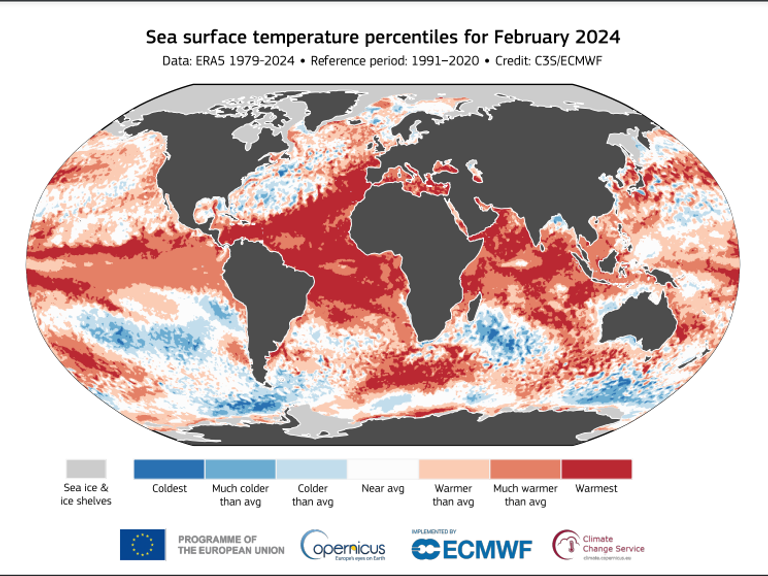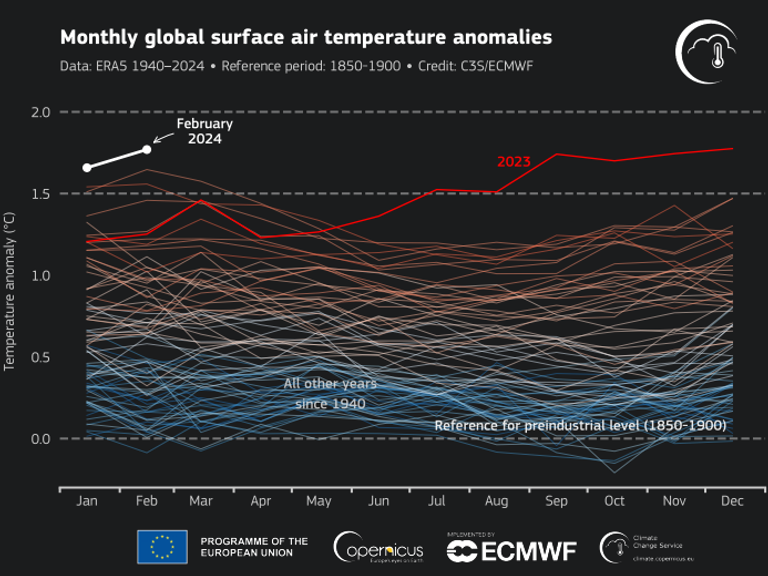Climate change: World’s oceans reach record temperature, prompting fears of worst mass bleaching
Climate change: World's oceans reach record temperature, prompting fears of worst mass bleaching Sky News


The World’s Oceans Reach Highest Temperature on Record
The world’s oceans have reached their highest temperature on record, raising fears that coral reefs are on the brink of a massive and potentially lethal heat shock.
Sustainable Development Goals (SDGs)
- Goal 13: Climate Action
- Goal 14: Life Below Water
New satellite data from the European Copernicus Climate Change Service shows the global average sea surface temperature in February was 21.06C, higher than the previous record of 20.98C set in August last year.
Impact on Oceans
- The Atlantic was particularly warm, including the sea around the UK.
- The US National Oceanic and Atmospheric Administration (NOAA) has warned sea temperatures are now so high that the world’s coral reefs face their fourth known mass bleaching event.
Heat stress can cause corals to expel the colourful algae living in their tissues. Without the algae they turn bleached white and are vulnerable to disease and starvation, and eventually die-off.
Derek Manzello, the coordinator of NOAA’s Coral Reef Watch told the Reuters news agency: “It’s looking like the entirety of the Southern Hemisphere is probably going to bleach this year.
“We are literally sitting on the cusp of the worst bleaching event in the history of the planet.”
Impact on Climate Change
- Data from the Copernicus Climate Change Service also shows the global average air temperature broke the February record, reaching 13.54C.
- That is 1.77C above the estimate of the long-term average for the month during pre-industrial times.
- It is the ninth time in a row that monthly records have been broken. Man-made climate change has been supercharged by a strong El Nino, with high water temperatures in the Pacific Ocean heating the atmosphere.
- The cyclical – and natural – El Nino event peaked in December and is now weakening, which should slightly reduce global temperatures in the coming months.
Scientists believe the world’s climate will become increasingly unstable if temperatures remain more than 1.5C above pre-industrial levels in the long term.
Related Topics:
- Climate Change
- Coral Reef
- Oceans
Read more:
- Warmest February since records began in England and Wales
- ‘We should be screaming fire on climate change’
- SDG 14: Life Below Water
14.2: By 2020, sustainably manage and protect marine and coastal ecosystems to avoid significant adverse impacts, including by strengthening their resilience, and take action for their restoration in order to achieve healthy and productive oceans. Resilience of marine and coastal ecosystems and restoration efforts. SDG 13: Climate Action 13.3: Improve education, awareness-raising, and human and institutional capacity on climate change mitigation, adaptation, impact reduction, and early warning. Education and awareness levels on climate change mitigation and adaptation. Behold! This splendid article springs forth from the wellspring of knowledge, shaped by a wondrous proprietary AI technology that delved into a vast ocean of data, illuminating the path towards the Sustainable Development Goals. Remember that all rights are reserved by SDG Investors LLC, empowering us to champion progress together.
Source: news.sky.com

Join us, as fellow seekers of change, on a transformative journey at https://sdgtalks.ai/welcome, where you can become a member and actively contribute to shaping a brighter future.









